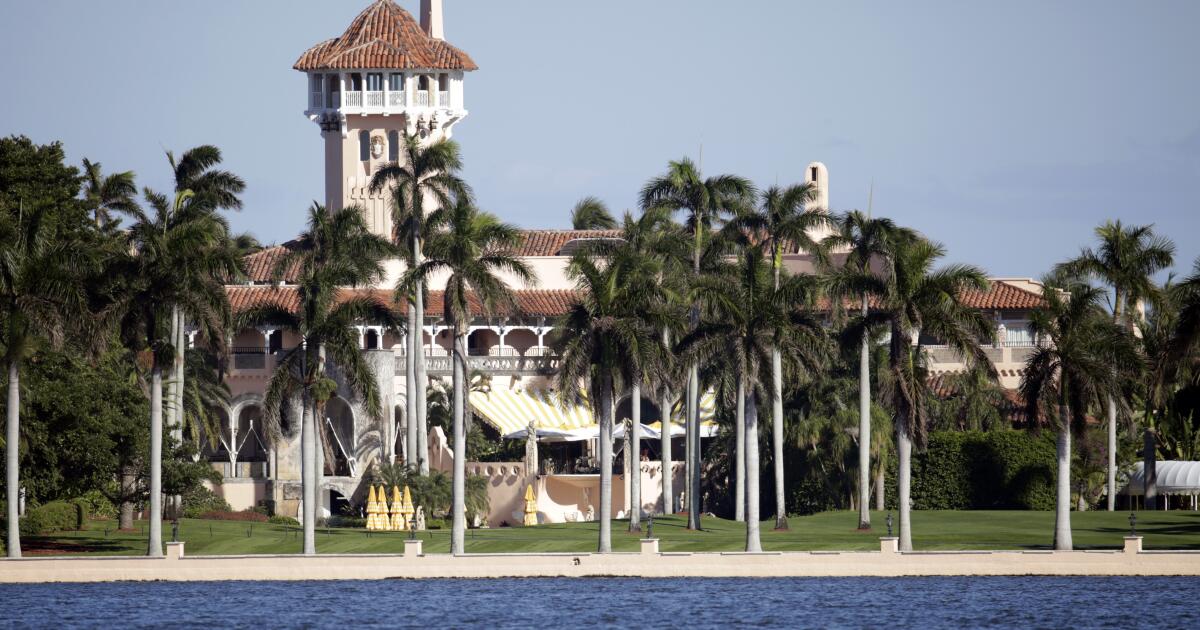Armed man shot and killed after entering secure perimeter of Mar-a-Lago, Secret Service says
An armed man drove into the secure perimeter of Mar-a-Lago, President Trump’s resort in Florida, as another vehicle was exiting before being shot and killed early Sunday morning, according to a spokesman for the U.S. Secret Service.
The man, who was in his early 20s and from North Carolina, had a gas can and a shotgun, according to Anthony Guglielmi, the Secret Service spokesman. The man had been reported missing by his family a few days ago, and investigators believe he headed south and picked up the shotgun along the way.
Guglielmi said a box for the weapon was discovered in the man’s vehicle after the incident, which took place around 1:30 a.m.
The man killed was identified by investigators as 21-year-old Austin Tucker Martin, according to a person familiar with the matter. The person spoke on condition of anonymity because they were not authorized to publicly discuss details of the investigation.
Trump has faced threats to his life before, including two assassination attempts during the 2024 campaign. Although the president often spends weekends at his resort, he and First Lady Melania Trump were at the White House when the breach at Mar-a-Lago occurred.
After entering near the north gate of the property, the man was confronted by two Secret Service agents and a Palm Beach County sheriff’s deputy, according to Palm Beach County Sheriff Ric Bradshaw.
“He was ordered to drop those two pieces of equipment that he had with them. At which time he put down the gas can, raised the shotgun to a shooting position,” Bradshaw said at a news conference. The two agents and the deputy “fired their weapons to neutralize the threat.”
The FBI asked residents who live near Mar-a-Lago to check any security cameras they may have for video that could help investigators.
Investigators are working to compile a psychological profile, and a motive is still under investigation. Asked whether the individual was known to law enforcement, Bradshaw said, “Not right now.”
The incident comes as the country has been rocked by spasms political violence.
Trump survived an assassination attempt during a 2024 campaign rally in Butler, Pa. The gunman fired eight shots, one grazing Trump’s ear, before being killed by a Secret Service counter-sniper.
A few months later, a man tried to assassinate Trump while he played golf at his West Palm Beach club, a few miles from Mar-a-Lago. A Secret Service agent spotted that man, Ryan Routh, aiming a rifle through the shrubbery before Trump came into view. Officials said Routh aimed his rifle at the agent, who opened fire and caused Routh to drop his weapon.
Routh was found guilty last year and sentenced this month to life in prison.
The White House referred all questions to the Secret Service and FBI.
There have been other recent incidents of political violence as well.
In the last year, there was the assassination of conservative activist Charlie Kirk; the assassination of the Democratic leader in the Minnesota state House and her husband and the shooting of another lawmaker and his wife; and an arson attack at the official residence of Pennsylvania Gov. Josh Shapiro.
Five days ago, a Georgia man armed with a shotgun was arrested as he sprinted towards the west side of the U.S. Capitol.
And on Jan. 6, 2021, a violent pro-Trump mob attacked the Capitol and tried to stop Congress’ certification of Joe Biden’s presidential election victory.
Price writes for the Associated Press. AP writer Alanna Durkin Richer contributed to this report.
